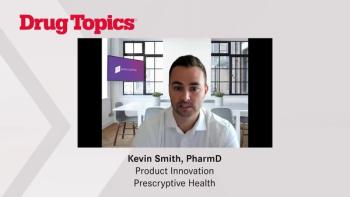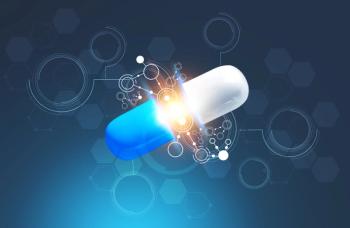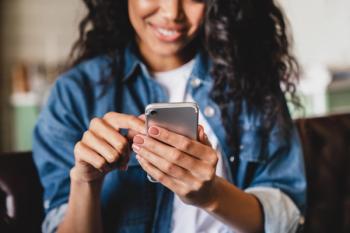
Smartphone Apps Deliver Medicines in New Ways
The smartphone can be a powerful clinical tool when used to leverage health care apps.
Mobile apps are changing the treatment landscape in the United States, and pharmacists are poised to play a major role. New apps offer the potential to disclose vital health information earlier than ever before, paving the way for entirely new ways of preventing a myriad of conditions. Researchers at the University of Pittsburgh and Carnegie Mellon University recently built the MyHealthyPregnancy platform, a patient-facing smartphone app and provider-facing portal that helps identify preeclampsia risk factors and other risks related to preterm birth.1
“In pregnancy and during lactation, there's a lot of opportunity for improving communication around safe and effective medication [use], as well as medication adherence,” lead author Tamar Krishnamurti, PhD, an assistant professor of medicine and clinical and translational science at the Pitt School of Medicine in Pittsburgh, Pennsylvania, told Drug Topics. “Collaborating with pharmacists to support their critical work in preventive care would be of great benefit to tools like MyHealthyPregnancy.”
The app currently is available to interested health care systems in the United States to tailor to their specific pregnant patient populations. The team behind the app plans to provide an off-the-shelf version directly to patients, as well as expand to pregnant populations in other countries. Senior study author Hyagriv Simhan, MD, professor and executive vice chair of obstetrical services at Pitt, said that this digital tool has the potential to offer additional support and facilitate further conversation with their providers.
“Pharmacists play such an important role in maximizing the health of our communities. In designing future studies of how best to optimize the health of women and their children, in the context of social drivers of health, will necessitate partnerships with so many stakeholders, including our colleagues in pharmacy,” Simhan told Drug Topics.
This specific app provides high-quality information, validated risk prediction, and connections to resources within and outside of the healthcare environment. Krisnamurti said there may also be a hidden benefit that comes with this type of mobile healthcare.
“When appropriate privacy protections are in place, these kinds of apps also can facilitate communication around topics that may be stigmatizing or difficult to discuss. Sometimes the additional layer of technology makes it easier to share sensitive information with your healthcare provider, even if you have a trusting relationship in place with them,” said Krisnamurti.
New Phone Apps Improving Mental Health
Individuals who are caring for older adults living with memory loss and other cognitive impairments can significantly reduce their depression and stress with a new phone app that helps the person focus on what is going on at the moment.2 Mindfulness therapy—the technique behind the Mindfulness Coach App—provides stress and anxiety management through psychoeducation, guided meditation, and mindfulness exercises to reduce symptoms of stress and depression. It was created by a team at the National Center for PTSD Research at the Department of Veterans Affairs.
There are many effective, non-pharmacological behavioral therapies to alleviate psychological symptoms, and mobile health apps don’t require trained professionals who are often expensive and unavailable in many geographic regions. “Pharmacists could certainly consider strategies to provide education or improve adherence to medications via mHealth apps,” said Elissa Kozlov, an instructor in the Department of Health, Behavior, Society and Policy at the Rutgers School of Public Health in New Brunswick, New Jersey.
Mobile Apps are being developed to combat all kinds of conditions, including depression, anxiety, post-traumatic stress disorder, and suicide prevention, to name a few. “I think apps are going to keep refining and expanding their capabilities to reach more individuals in need. I absolutely think they will be increasingly popular, especially as federal regulations keep pace with the advances we are making in mHealth,” said Kozlov.
“The FDA is highly interested in digital health which includes mobile health, wearable devices, telehealth, and health information technology. I think we should expect to see a lot more research and implementation surrounding digital health in the future.”
Lisa Schwartz, PharmD, senior director of professional affairs at the National Community Pharmacists Association (NCPA), said that mobile apps are ideal tools to access information and track data points. However, she cautioned that anyone recommending or using an app for health care should understand the app developer’s privacy practices and liability waivers.
“For example, an app offered by an employer’s health plan is going to be covered by HIPAA, whereas a fitness tracker probably is not. Similarly, an app that is in FDA’s device registry is accountable for being safe and effective,” Schwartz told Drug Topics.
This revolution in delivering healthcare through a mobile app can have some pitfalls. Adopting something quickly without thoroughly vetting it, could create new health problems. Schwartz cautioned pharmacists need to do their homework before recommending any specific app. “Where applicable, read up on the treatment guidelines built into an app, before using it in practice or recommending it to patients,” said Schwartz.
References
1. Krishnamurti T, Davis AL, Rodriguez S, Haet al.
2. Kozlov E, McDarby M, Pagano I, Llaneza D, Owen J, Duberstein P.
Newsletter
Pharmacy practice is always changing. Stay ahead of the curve with the Drug Topics newsletter and get the latest drug information, industry trends, and patient care tips.























